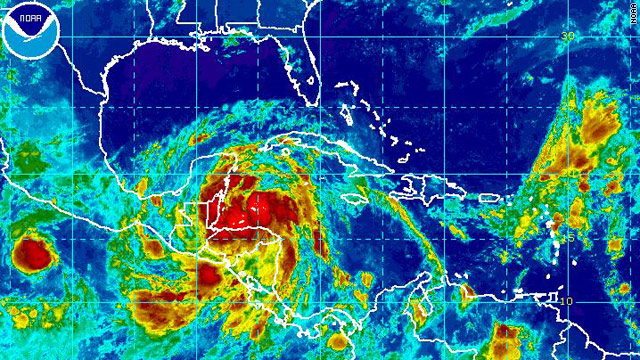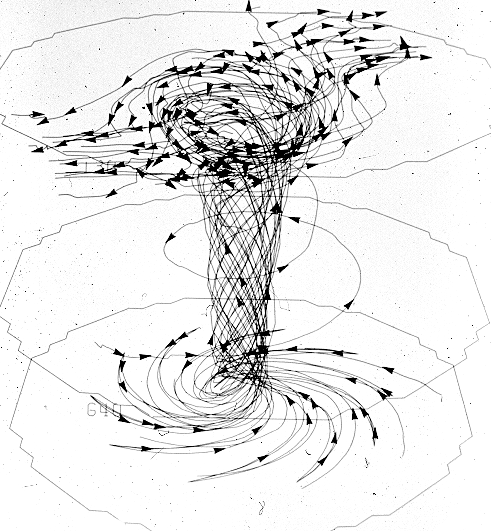The first tropical storm of the season, Alex, is forecast to move to the west of the release by current estimates. There are lots of questions and unknowns about how things might play out with regard to the spill. The cyclone pulls winds into itself, likely creating NE to E to SE winds to the east of the storm as it moves north. There are waves and currents further complicating things. A big concern is with wind on top of the storm surge driving the spill further into estuaries. Also, I wonder at what points they may be forced to suspend recovery operations and perhaps even drilling of the intercept wells? Not that there is much that we can do about it at this point, but I also wonder about the impact on the submerged plume in the upper part of the water column. Hurricanes have created tremendous forces moving, righting, even breaking up wrecks in the past. This stuff is largely out of sight but its effects may be more observable in time.

"Tropical storm plus oil slick equals more fear and uncertainty
By the CNN Wire Staff - June 26, 2010 8:30 a.m. EDT
Tropical Storm Alex -- the first named storm of the 2010 Atlantic hurricane season -- formed in the Caribbean on Saturday. Alex had maximum sustained winds of 40 mph and was about 250 miles away from Chetumal, Mexico. It was moving toward Belize and over the Yucatan Peninsula.
"The greatest nightmare with this storm approaching is that it takes this oil on the surface of the Gulf and blows it over the barrier islands into the bays and the estuaries," Sen. Bill Nelson, D-Florida, told CNN. "And that is where you really get the enormous destruction, because it's just very difficult to clean up those pristine bays."
Alex is heading is west-northwest direction and was not predicted to directly pass over the massive oil slick caused by the ruptured BP undersea well, though its path could change.
A tropical storm in the Gulf has the potential to disrupt BP efforts to collect gushing oil and drill relief wells. It would also complicate efforts to clean up miles of coastline. High winds and seas could distribute the oil -- still gushing from a blown deepwater well -- over a wider area while storm surges could wash more oil ashore, according to a fact sheet prepared by the National Oceanic and Atmospheric Administration."
Lots more information in this article at:
http://www.cnn.com/2010/US/06/26/gul...ex.html?hpt=T1

The current five day projected path. Joy, I see they've now predicted it will become a hurricane before landfall on or about Wednesday morning. There are lots of unknowns and variables though. It has yet to cross over land, much less pass beyond it into the Gulf. Changes may well occur as time wears on.
NHC information on TS Alex at:
http://www.nhc.noaa.gov/refresh/grap...daynl#contents
This is what the Deep Horizon Response page has to say about it.
"Hurricanes and the Oil Spill
What will the hurricane do to the oil slick in the Gulf?
• The high winds and seas will mix and “weather” the oil which can help accelerate the biodegradation process.• Movement of oil would depend greatly on the track of the hurricane.
• Storms’ surges may carry oil into the coastline and inland as far as the surge reaches. Debris resulting from the hurricane may be contaminated by oil from the Deepwater Horizon incident, but also from other oil releases that may occur during the storm.
What will the hurricane do to the oil slick in the Gulf?
• The high winds and seas will mix and “weather” the oil which can help accelerate the biodegradation process.
• The high winds may distribute oil over a wider area, but it is difficult to model exactly where the oil may be transported.
• Movement of oil would depend greatly on the track of the hurricane.
• Storms’ surges may carry oil into the coastline and inland as far as the surge reaches. Debris resulting from the hurricane may be contaminated by oil from the Deepwater Horizon incident, but also from other oil releases that may occur during the storm."
Continued at:
http://www.deepwaterhorizonresponse....c/2931/572167/

A plan view of a hurricane wind field. The wind flows towards the dot at the base of the wind speed/direction indicators.
http://www.jason.org/digital_library/169.aspx

A 3-D representation of wind vectors in a hurricane
http://www.ems.psu.edu/~nese/images.htm

Wind and storm surge characteristics relative to the storm center and direction of travel. Per this diagram, the transport of oil inland would be worse to the east of the eye within a limited distance via the leading edge winds and storm surge. Winds are offshore with limited storm surge in general terms to the west of the eye.
http://www.hurricanetrack.com/ncstormsurge/srginf.html

Diagram of right front quadrant winds, storm surge with an oblique impact relative to the shoreline.
AND for something out of left field ...
"Worry Underwater: Oxygen Levels Drop as Oil Continues to Flow
Marine Animals Crowd Shallow Gulf Waters as Worries Over Oxygen Levels Grow
By MATT GUTMAN and SADIE BASS June 23, 2010
Evidence of marine biologists' doomsday scenario thrashes in the Gulf waters as sharks crowd into shallow waters. Undersea accident forces BP to remove cap as oil washes up on Pensacola beaches. Marine biologists say the sea animals flee the spill zone the way others would flee a forest fire. With thousands of gallons of oil contaminating their natural habitats, marine creatures press into oil-free waters.
"Their habitat is shrinking, tens of thousands of square miles are affected, and animals moving away from them," said Mobi Salangi, director of the Institute for Marine Mammal Studies. "There are changes in food, the food they eat and their prey."
Plumes of dense oil in shallow waters, up to 50 feet below the surface, have sucked up oxygen. Tests by the Dauphin Island Sea Lab usually show oxygen levels in the shallow waters at nearly eight parts per million. They're now down to two parts per million -- four times lower than normal."
Article and video at:
http://abcnews.go.com/WN/bp-oil-spil...ry?id=10991637